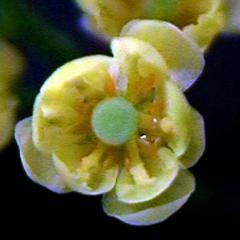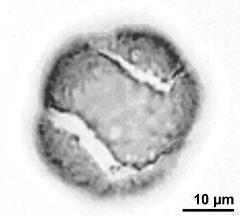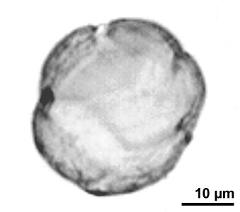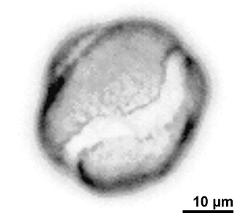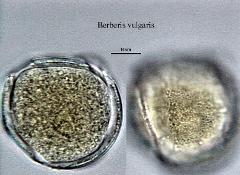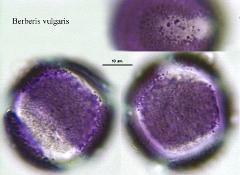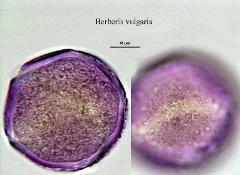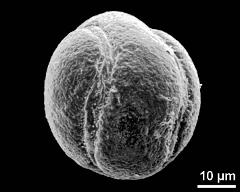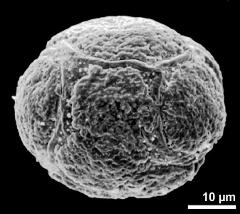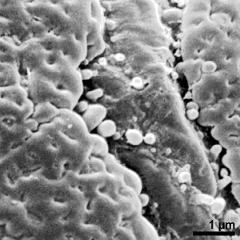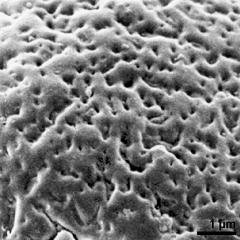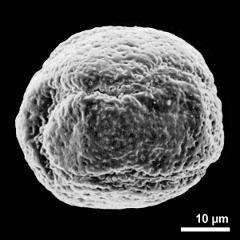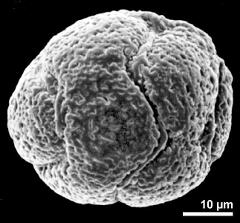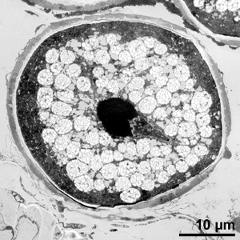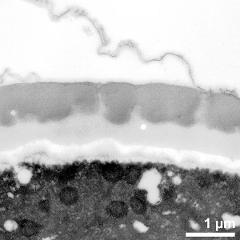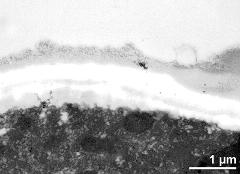Berberis vulgaris
Taxonomy: Angiospermae, Ranunculales, Berberidaceae, Berberis
Links: http://flora.nhm-wien.ac.at/Seiten-Arten/Berberis-vulgaris.htm
Published: 2020-11-11
Pollen Description
Shape, Size and Aperture
pollen unit: monad, dispersal unit and peculiarities: monad, size (pollen unit): medium-sized (26-50 µm), size of hydrated pollen (LM): 41-50 µm, shortest polar axis in equatorial view (LM): -, longest polar axis in equatorial view (LM): -, shortest diameter in equatorial or polar view (LM): 41-50 µm, longest diameter in equatorial or polar view (LM): 41-50 µm, pollen class: spiraperturate, polarity: -, P/E-ratio: -, shape: spheroidal, outline in polar view: circular, dominant orientation (LM): oblique, P/E-ratio (dry pollen): -, shape (dry pollen): spheroidal, outline in polar view (dry pollen): circular, infoldings (dry pollen): not infolded, aperture number: 1, aperture type: spiral aperture(s), aperture condition: spiraperturate, aperture peculiarities: -
Ornamentation and Structure
LM ornamentation LM: verrucate, gemmate, scabrate, nexine: -, sexine: -, SEM ornamentation SEM: perforate, psilate, suprasculpture SEM: -, TEM tectum: eutectate, infratectum: absent, foot layer: absent, endexine: compact-continuous, intine: monolayered, wall peculiarities: -, supratectal element: -
Miscellaneous
pollen coatings: pollenkitt, reserves in cytoplasm: lipids, starch, cell number: 2-celled, Ubisch bodies: absent
Author(s) of diagnosis: Oberschneider, Wolfgang; Heigl, Helmut
Pictures
Picture legend
- flower(s), photographer: Oberschneider, W.
- upper focus - fresh, acetolyzed, unstained, photographer: Oberschneider, W.
- optical section - fresh, acetolyzed, unstained, photographer: Oberschneider, W.
- lower focus - fresh, acetolyzed, unstained, photographer: Oberschneider, W.
- hydrated Pollen - fresh, glycerine, unstained, photographer: Heigl, H.
- hydrated Pollen - fresh, glycerine, ruthenium red, photographer: Heigl, H.
- hydrated Pollen - fresh, glycerine, ruthenium red, photographer: Heigl, H.
- hydrated pollen grain - fresh, rehydration (water) & chloroform & critical point dried & sputter coated with gold, photographer: Oberschneider, W.
- interapertural area of pollen grain - fresh, rehydration (water) & chloroform & critical point dried & sputter coated with gold, photographer: Oberschneider, W.
- detail of aperture - fresh, rehydration (water) & chloroform & critical point dried & sputter coated with gold, photographer: Oberschneider, W.
- exine surface - fresh, rehydration (water) & chloroform & critical point dried & sputter coated with gold, photographer: Oberschneider, W.
- dry pollen grain - dry, sputter coated with gold, photographer: Oberschneider, W.
- dry pollen grain - dry, sputter coated with gold, photographer: Oberschneider, W.
- generative cell (right) and vegetative nucleus (left, dark); note starch grains (white) - fresh, glutaraldehyde & osmium & potassium ferrocyanide, uranyl acetate & lead citrate, photographer: Oberschneider, W.
- pollen wall - fresh, glutaraldehyde & osmium & potassium ferrocyanide, modified Thiéry-test, photographer: Oberschneider, W.
- aperture - fresh, glutaraldehyde & osmium & potassium ferrocyanide, modified Thiéry-test, photographer: Oberschneider, W.
Literature
- (1998) Pollenmorphologie der Ranunculanae. Diplomarbeit. Universität Wien : 125 pp
- (1974) Caractères ultrastructuraux et cytochimiques particuliers du sporoderme des pollens de Berberis vulgaris L. et de Mahonia aquifolium Nutt. CR Acad Sc Paris 278: 1475-1477
- (1994) Exkursionsflora von Österreich : 1180
- (1998) Preparing living pollen material for scanning electron microscopy using 2,2-dimethoxypropane (DMP) and criticalpoint drying. Biotechnic Histochem 73: 137–143
Copyright and Citation
Cite this publication as:
Oberschneider W., Heigl H. 2020. Berberis vulgaris. In: PalDat - A palynological database. https://www.paldat.org/pub/Berberis_vulgaris/303900;jsessionid=D56FEDC3E7E1D2CB06C9C60ACFCE9117; accessed 2025-11-01

